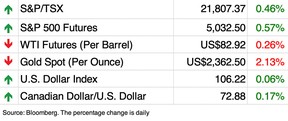Posthaste: These loans are raising credit risk red flags in Canada
Lenders starting to get nervous that jump in jobless rate could spark more defaults

Article content

Credit risk monitors that have been keeping a close eye on loan performance in Canada as higher interest rates put pressure on borrowers, say lenders are starting to get nervous.
The jump in the unemployment rate and loss of jobs in March “is stoking unease about the short-run outlook for loan performance,” said Moody’s Analytics.
Canada lost over 2,000 jobs and the unemployment rate rose to 6.1 per cent last month, its highest level in two years — a surprise for economists, who had been expecting a jobs gain.
Up until recently a strong labour market and steady wage growth have bolstered credit performance. “If Canadian households were to lose this crucial support, as the March jobs report hinted, default rates would quickly accelerate higher,” said Moody’s Brendan LaCerda.
The good news is that residential loans, such as mortgages and home equity lines of credit or HELOCs, remain firmly below their pre-pandemic levels.
Nor are credit cards and unsecured loans — though back in line with historic norms — ringing alarm bells.
Auto loans, however, are becoming a cause for concern.
“While every other credit segment continues to outperform its pre-recession average, auto loans delinquencies’ upward trend presents a troubling development,” said LaCerda.

According to data from Equifax Canada and Moody’s, delinquencies on auto loans have already surpassed their pre-pandemic average and are showing signs of accelerating.
This isn’t just borrowers being a month late. The number of loan payments which are 60, 90 and 120 days late is growing.
Moody’s says in some ways this reflects a long-running industry trend. Auto loan balances for lower credit scores have risen faster than higher scores since 2011, except for a brief period when there was a pullback in risky lending.
Unlike home equity where values have shot up over the past few years, auto loans often fall into negative equity, which puts borrowers at risk of default if they run out of cash and have to sell their vehicle.

In its credit report last month, Equifax Canada flagged an almost 30 per cent rise in delinquency rates for non-mortgage balances that were 90 days or more over due.
More than 153,000 more consumers missed payments on credit products in the fourth quarter of 2023, beating 2019 levels.
“Factors such as high cost of living, inflation, credit card payments, and mortgage renewal worries are coming at consumers right now,” said Rebecca Oakes, vice president of advanced analytics at Equifax Canada.
“Budgets have been pushed to the limit for some. There’s no doubt Canadians are feeling the financial pinch.”
Whether high delinquency rates rise further depends to a great extent on the Bank of Canada, said LaCerda.
Reducing the interest rate this summer would boost consumer sentiment and spending, and perhaps prevent deeper job losses.
“Delaying longer risks inflicting further strain that could spark a more serious credit shock,” he said.
Sign up here to get Posthaste delivered straight to your inbox.

It’s looking like the Bank of Canada will pull the trigger on interest rate cuts before the United States Federal Reserve. So what’s that mean for the Canadian dollar?
Normally, Canada’s central bank and the Fed move pretty much in sync, but a gap or expectations of a gap in policy rates puts pressure on the northern nation’s currency.
The loonie sunk to 72 cents after last week’s inflation report strengthened the case for Canada’s central bank to move before the Fed, and Bank of Montreal senior economist Sal Guatieri warns that “further sharp depreciation could become an issue.”
This poses a conundrum for the Bank of Canada because a weak Canadian dollar has the potential to fuel inflation because of higher import costs.
It’s partly due to the weaker currency that Canada’s core goods inflation is running slightly hotter than in the U.S., as today’s chart shows, said Guatieri.
Economists surveyed by Bloomberg are divided on how far the policy gap can widen before things start getting uncomfortable. Some say it’s 100 basis points; others think 50 bps.
“So far, the weak Loonie is adding welcomed support to the economy without threatening price stability,” said Guatieri. “But that could change if it takes a further swan dive.”
- Bank Of Canada Market Participants Survey for first quarter
- Today’s Data: Canada industrial product and raw materials price indices for March, new housing price index for March
- Earnings: Winpak Ltd, PrairieSky Royalty Ltd, Verizon Communications Inc, Nucor Corp

- Canada’s immigration dilemma — not enough workers or not enough homes
- Here’s what you need to know about the increased capital gains tax
- Is the 60/40 portfolio no longer viable? If so, what’s the new normal?
Is the 60/40 portfolio no longer viable? If so, what’s the new normal? An allocation to market-neutral investments can still stabilize portfolios against unforeseen events, but portfolio manager Amar Pandya says you should keep in mind that an enduring negative correlation between equities and bonds is not set in stone. Find out more at FP Investing.
Are you worried about having enough for retirement? Do you need to adjust your portfolio? Are you wondering how to make ends meet? Drop us a line at aholloway@postmedia.com with your contact info and the general gist of your problem and we’ll try to find some experts to help you out while writing a Family Finance story about it (we’ll keep your name out of it, of course). If you have a simpler question, the crack team at FP Answers led by Julie Cazzin or one of our columnists can give it a shot.
McLister on Mortgages
Want to learn more about mortgages? Mortgage strategist Robert McLister’s Financial Post column can help navigate the complex sector, from the latest trends to financing opportunities you won’t want to miss. Read them here
Today’s Posthaste was written by Pamela Heaven with additional reporting from Financial Post staff, The Canadian Press and Bloomberg.
Have a story idea, pitch, embargoed report, or a suggestion for this newsletter? Email us at posthaste@postmedia.com.
Bookmark our website and support our journalism: Don’t miss the business news you need to know — add financialpost.com to your bookmarks and sign up for our newsletters here.







Postmedia is committed to maintaining a lively but civil forum for discussion. Please keep comments relevant and respectful. Comments may take up to an hour to appear on the site. You will receive an email if there is a reply to your comment, an update to a thread you follow or if a user you follow comments. Visit our Community Guidelines for more information.